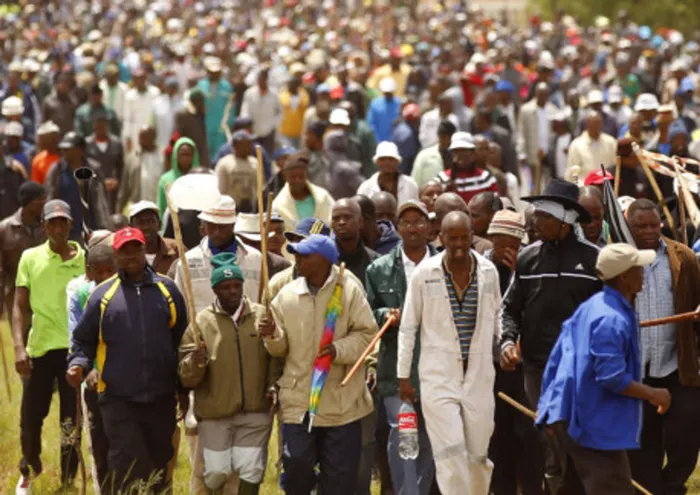AngloGold sacks miners after deadline

Striking miners chant slogans as they gather at the AngloGold Ashanti mine in Carletonville, north-west of Johannesburg, on Wednesday. Striking miners chant slogans as they gather at the AngloGold Ashanti mine in Carletonville, north-west of Johannesburg, on Wednesday.
Carletonville - AngloGold Ashanti sacked 12 000 wildcat strikers who defied a deadline to return to work on Wednesday, the latest South African company to resort to mass firings after weeks of crippling labour unrest.
Thousands of stick-wielding strikers responded by rallying near the operations of AngloGold, the world's third-largest bullion producer, saying they would not buckle under company pressure.
“Can you see how many of us are here? No one will fire such a number of people,” one of the labour leaders said to the crowd of strikers at the company's West Wits operations near Carletonville, about 65km west of Johannesburg.
Several companies have told strikers to return to work or lose their jobs in a last-ditch move to resolve widening strikes that have poisoned labour relations and marred the image of Africa's top economy.
AngloGold had given strikers until noon on Wednesday to return. The roughly 12 000 striking employees at its West Wits operation failed to return, spokesperson Alan Fine said.
“The deadline has now passed and that means the process of issuing dismissals would begin now,” he told Reuters.
About 24 000 AngloGold employees - the majority of its workforce - went on strike at the sprawling West Wits and Vaal River complexes. Fine said the 12 000 strikers at Vaal River have gone back to work.
About 100 000 workers have downed tools for better pay in South Africa since August in a wave of strikes that has sparked two ratings agencies to downgrade the country's debt.
The unrest has also left a black mark on President Jacob Zuma's government. Zuma has been criticised for his handling of the August 16 “Marikana massacre” where police shot dead 34 strikers in a single day.
In Carletonville some of the miners locked arms and other danced the rhythmic “toyi toyi” dance popularised during the anti-apartheid struggle.
One carried a sign aimed at the president: “Zuma, how many mine workers died in Marikana? Do you want more to die again?”
While the strikes drag on, output suffers.
AngloGold said on Wednesday its third-quarter production fell well below its previous guidance due to the strikes. The company said it produced 1.03-million ounces for the quarter, having earlier forecast as much as 1.10-million.
AngloGold is the latest case where the hardball negotiating tactics have failed to get substantial numbers of strikers back to work. Rival Harmony Gold has also given wildcat strikers an ultimatum to return to work on Thursday.
Strikes have steadily spread since starting in the platinum industry in August, threatening to further disrupt South Africa's already shaky growth.
The strikes have changed the nature of labour in Africa's biggest economy, Impala Platinum chairperson Khotso Mokhele told reporters after the company's annual general meeting in Johannesburg on Wednesday.
“Of course the strike changed the labour dynamics,” he said.
“It clearly is changing the dynamics of the mining sector as a whole and one could argue, in the entire industrial relationship set-up in the country.”
In another sign the unrest was continuing to spread, coal miner South African Coal Mining Holdings said that some of its operations had been interrupted due to a new union-led strike over wages.
Gold Fields, the world's fourth-largest bullion producer, sacked 8 500 wildcat strikers at its KDC East mine on Tuesday after they ignored an ultimatum. Anglo American Platinum (Amplats), the world's largest platinum producer, also sacked 12 000 at its Rustenburg operations earlier this month.
The company said on Wednesday that 7 000 of its striking South African employees had appealed their dismissal notices.
Amplats said last week that it would now be delaying the dismissal process at its Union and Amandelbult operations, where it employs 20 500 people. It also said it was open to discussing the reinstatement of the sacked workers with unions. - Reuters